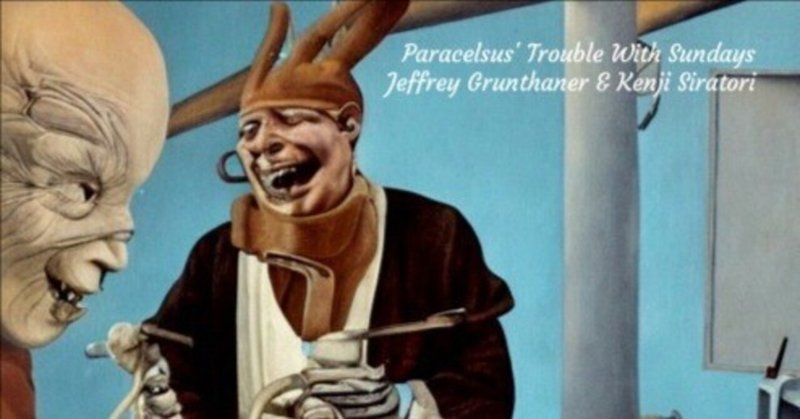
Paracelsus' Trouble With Sundays

What holds a narrative together and gives presence to its myriad representations is the chronotope: the narratological reification of time and space welded as one via the technology of narrative. Bakhtin writes that that chronotope explains how in literature time “thickens, takes on flesh, becomes artistically visible” and “space becomes charged and responsive to the movements of time, plot and history”; yet time in Grunthaner Paracelsus’ Trouble With Sundays diffuses, turns to dust, and, when given breath, prismatically stochastizes while space reiterates itself in 2.7095 dimensions. Not only a work of explosive memetics, handwritten marginalia, superimpositions, cut-up, conceptual noise, and visual art by multimedia iconoclast Kenji Siratori, Paracelsus’ Trouble With Sundays ultimately enacts the potency of supermodern narrative structures marked strictly by their obtuse refusal to represent a world as it was handed to us.
- Andrew C. Wenaus, author of Ω - 1 Chronotopologic Workings and director of The Ministry of Transrational Research into Anastrophic Manifolds
The world of contemporary poetry is vast and varied, embracing an array of styles, forms, and voices. Among the diverse range of poets, Jeffrey Grunthaner stands out as an artist who challenges traditional boundaries, infusing his work with a unique blend of humor, surrealism, and transcendence. His recent chapbook, "Aphid Poems," showcases his distinctive approach to language and expression. Grunthaner's poetry, while seemingly dislocated and enigmatic, carries a profound sense of narrative and adventure. We will delve into Jeffrey Grunthaner's "Paracelsus' Trouble With Sundays" to explore his unconventional poetics and the interplay between words, visuals, and music in his creative journey. The Unconventional Poetry of Jeffrey Grunthaner: Jeffrey Grunthaner's poetry is far from conventional. His work often feels like a rebellious departure from the norms of the contemporary poetry landscape. Grunthaner's approach disrupts traditional genre boundaries, inviting readers to venture into a realm where interpretation is both challenging and rewarding. His writing possesses a unique quality—it is easy to love yet challenging to analyze. Grunthaner's poetry has the power to disrupt established paradigms and redefine the essence of poetic expression. In "Aphid Poems," Grunthaner's language is lush and vibrant, overflowing with an effusive quality. He captures the reader's imagination, immersing them in a world where the boundaries of reality and imagination blur. His words unfold like a journey, a narrative that unfolds before us. Yet, beneath the seemingly disorienting language, there is a thread of storytelling and adventure, offering readers a glimpse of a drama lived through the poet's lens. Narrative and Adventure in Grunthaner's Poetry: Despite the apparent dislocation in Grunthaner's poetry, there exists a subtle undercurrent of storytelling and adventure. He skillfully weaves elements of narrative into his work, providing readers with a sense of unfolding events. While these narratives may not be autobiographical, they serve as tropes that anchor the reader's experience. The poems are imbued with humor and light-heartedness, offering a sense of adventure beyond the mundane aspects of life. Grunthaner's poetry celebrates time-wasting as a form of time discovered, an opportunity to find meaning beyond conventional productivity. The poems resonate with a feeling of presence, vitality, and a sense of the present moment. The Book as Artifact: Grunthaner's engagement with the book format extends beyond mere storytelling. For him, books are artifacts, repositories of a specific time and place. They offer insights into the cultural and historical context in which they were created. Grunthaner views books as archives, documenting shifts in perspective and ideology. Just as classic works like "À rebours" or Hegel's "Phenomenology" are representative of the nineteenth-century period, his poetry serves as a reflection of our contemporary era. Music as Poetry: Grunthaner's creative journey extends beyond the written word into the realm of music. His music, like his poetry, is rooted in improvisation. It involves combining a palette of phrases and ideas in the heat of the moment, creating a unique experience for the audience. This approach aligns with his belief that everything he does relates to writing and composition. Music becomes another vehicle for his poetic expression. Beauty and Transcendence: While Grunthaner's poetry may not conform to traditional notions of beauty, it retains a sense of beauty as a means of transcendence. His work reminds us that language can serve as a vehicle for transcendence, moving beyond the confines of everyday experience. Grunthaner explores the notion of beauty as a way to stretch our understanding of the world, pushing boundaries and challenging conventional perspectives. Jeffrey Grunthaner's "Paracelsus' Trouble With Sundays" and his broader body of work represent a departure from conventional poetry. His unconventional poetics invite readers to explore the boundaries of language and expression, offering a unique blend of narrative, adventure, and humor. Through his exploration of various creative forms, from visuals to music, Grunthaner demonstrates that poetry is not confined to a singular medium. Instead, it is a dynamic and ever-evolving art form that can transcend conventional norms. His work serves as a testament to the enduring power of language to capture the ineffable and open doors to new realms of experience.
Jeffrey Grunthaner is an artist & writer currently based in Berlin. Essays, articles, poems, and reviews have appeared via BOMB, artnet News, The Brooklyn Rail, American Art Catalogues, Hyperallergic, Heavy Feather Review, Arcade Project, Folder, Drag City Books, and other venues. Their poetry pamphlet, Aphid Poems, will be published later this year by The Creative Writing Department. Some recent curatorial projects include the reading and discussion series Conversations in Contemporary Poetics at Hauser & Wirth (NY), Sun Oil for Open White Gallery (Berlin), and FEELINGS for synthesis gallery (Berlin).
この記事が気に入ったらサポートをしてみませんか?
